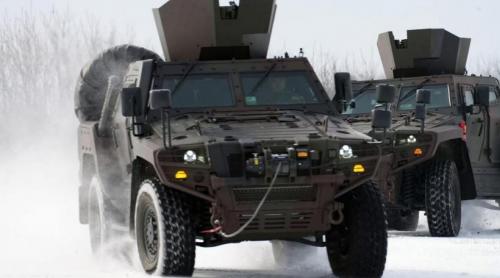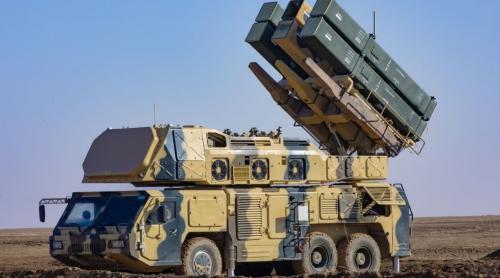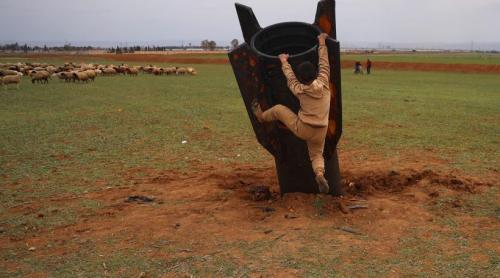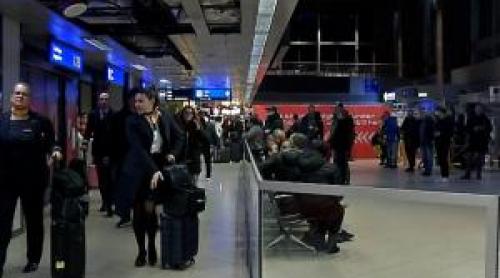
Krista van Veltzen is the Dutch member of the Parliament for whom the agreement for the selling of the "Hawk" systems for 23.5 million euros to Romania by her country is very questionable. The member of the Parliament wanted to find out whether the Romanians knew about the hundreds of complaints of the Dutch army men who worked with these equipments, which were filed in as a result of the strange cancer cases. The Ministry of Defense said "Yes", but it didnât get into any details.
Until now, the Dutch member of the Parliament is the only politician that really cares about the lives of the army men that will work with these systems. The Romanian politicians, the power or the opposition, are quiet, the former and present dignitaries of the Romanian Ministry of Defense donât say a word, and the Dutch Minister of Defense behaved like an ostrich when asked for his opinion. Due to these conditions, the clues saying this had been the price of our integration in the EU, during the exact period in which Holland was the president of the Union, seem to be more and more certain. This also explains the "top secret" character of the file. Kristen van Veltzen, our interviewee, clearly reveals that the modern PIP III missiles actually expire this year, and the Dutch wanted to get rid of them, because their exploitation is expensive.Jurnalul National: For the beginning, give us a short description of the Hawk PIP III antiaircraft defense system.
Krista van Veltzen: The Hawk systems became the property of the Dutch air Forces in the 60s. The aviation has four so-called Triple Air Defense (TRIAD) squadrons. For this TRIAD concept, the Hawk systems are used for lower altitudes than the ones the Patriots are used for, the small and medium altitudes. The systems have been improved for several times during the years, for three times, to be more specific. The last one was the Program for the Improvement of the Product no. 3 - PIP III. However, by the end of this year, the systems get to the end of their operational and technical resources. Moreover, the air Forces found replacements for them. In the same time, some of the missiles in the reserve have passed their expiry date. The truth is that their exploitation is getting more and more expensive, since less and less states use them.
JN: When did the Dutch Government take the decision of "getting rid" of them?
KvV: I donât know the exact period of time. I know that the last missiles were symbolically launched in the summer of 2002.
JN: How many states have shown their interest in buying them?
KvV: As far as I know, Turkey was the only country involved, besides Romania. The negotiations with Romania took place last year.
JN: Tell us about the contract. What do you know about it?
KvV: The Dutch Minister of Defense released a public statement on the 6th of December last year. This was saying that the agreement involved 8 Hawk PIP III systems 78 DAF YA-5442 vehicles, and the contractâs total value was 23.5 million euros.
THE DISEASES
JN: The Hawk PIP III antiaircraft defense systems are very polemic in Hollandâ¦
KvV: Yes, ever since the 90s, there have been a lot of complaints from the personnel that worked with these missiles and that suffered from rare forms of cancer and leukemia. The Ministry of Defense asked for an investigation of the situation. This wasnât the first investigation of this kind, but the previous one hadnât been enough cogent. The Ministry considers there arenât enough scientific proofs to support the connection between the Hawk systems and the diseases. We (n.e. - the Socialist Party) asked for an epidemiological investigation. In an official letter to the Parliament (27580, no. 8), the Government announced there were 212 people that complained. 73 of them suffer from cancer, 48 from other diseases, and 91 people didnât specify the disease.
JN: What is the present situation?
KvV: Officially, the Government waits for the results of the Belgian study. The investigation started in 2001 and should have ended by now, but nothing was made public. They keep postponing this. As for the research in Holland, the first investigation ended unconvincingly. The Parliament and the unions in the army asked for a new investigation. In May, TNO, a medical and biological research institute, started a new investigation. The results are expected to come in October this year. This investigation will also refer to the cases in the USA, Spain and Germany.
JN: Therefore, Holland isnât the only state in which these diseases appeared and where the army men filed in reclamations.
KvV: No, as far as I know, there are similar discussion and controversies in Belgium, since they use the same system. The USA, Germany are other states. EUROMIL, the association of the military personnel unions, is also interested in these discussions.
THE CONTRACT
JN: There have been discussions regarding these systems and their selling to Romania in the Dutch Parliament. As far as we know, you were the one that asked the defense State Secretary, Cecilius van der Knapp, more questions regarding this issue. What were his answers?
KvV: He said the Romanians knew about the discussion that took place in the Netherlands and they wanted to buy the missiles. To be more specific, I asked him: "Taking into account that the missiles will be certainly owned by the Romanian Air Forces, I would like to know whether the state secretaries informed his Romanian counterparts about the health problems and the supposed connection between them and the Hawk systems. If there are so many uncertainties in Holland, wouldnât it be fairer to keep the missiles and put them somewhere such that there wouldnât appear this kind of problems in other countries?" Van der Knap answered: "The debates in Holland are obviously known in Romania. We donât want to get into the way of our Romanian colleagues and not let them buy the missiles, because they are excellent systems. The Romanians are delighted and we are content we managed to sell them. This is all for now". And he said one more time that the debates were a known fact in Romania.
JN: You have also asked whether the State Secretary is prepared to support the consequences of the appearance of diseases because of these missiles...
KvV: His answer was he didnât want to offer Romania the chance to return these systems. I asked Secretary Van der Knap twice. The first time I did it after the appearance of an article in De Telegraaf. However, this was a very short conversation, so he avoided answering the question. The second time it was during a discussion regarding the impact on the soldiersâ and the civiliansâ health and the Hawk systems were also in the agenda. I asked because, a few years ago, Holland wanted to sell expired mines to other states and there are some debates in the present regarding the commercialization of some of those mines, even if Ottawa Convention said they would be destroyed. The Hawk problems couldnât have been scientifically proved, but I believe the Government should inform the states that want to purchase them about the suspicions.
JN: Sources inside the secret services that want to remain anonymous told us Romania didnât quite have any choice and there seem to be some clues indicating we were somehow forced, in the period in which Holland was presiding the EU. For example, during the European Council on the 17th of December, Romania received the confirmation of the political negotiations regarding the EU adherence.
KvV: I donât know anything about this, but this is terrifying if the information is true. We are a civilized country and "forcing" other states to buy such suspicious systems is a very serious problem.
JN: Is there any NATO investigation regarding this issue?
KvV: No, as far as I know.
JN: When we started this investigation, we sent a series of questions to the Romanian Ministry of Defense as well as to the Dutch Embassy in Bucharest. The embassy answered, after consulting the Dutch Defense Minister, they didnât have "any information regarding this contract". But they also told us it contained classified information that couldnât be made public, even though we were able to find out a lot from the official web page of the Dutch Air Forces even since the 6th of December, as you told us. How do you comment this answer of the embassy?
KvV: As for the embassy, the contract has been signed at a ministerial level, so it is very possible they donât know the details.
|
CV
|
|
Dutch member of the Parliament Krista van Veltzen was born in 1974. She graduated from Natural Sciences and Environment Conservation. After college, she started to work for several Non-Governmental Organizations in Central and Western Europe, as well as with Eastern European organizations on nuclear and military problems. Mother Earth, Friends of the Earth, A SEED (Action for Solidarity, Ecology, Equality and Development) and INV (an organization that takes care of the education of the adults and the youth for issues regarding the environment) are some of the NGOs she worked for. She entered the Socialist Party in 1999. Initially, she worked as a specialist for military problems. In May 2002, she was elected to represent the Socialist Party in the Dutch Government. She is part of the Inferior Chamber of the Parliament as a spokesperson for defense, environment and agriculture issues.
|
Citește pe Antena3.ro


















